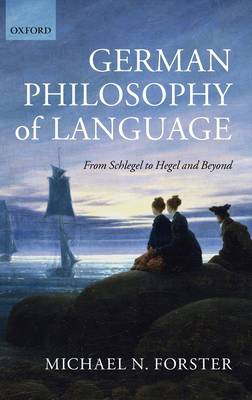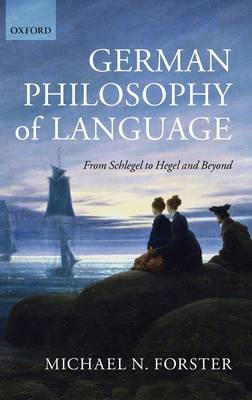
Je cadeautjes zeker op tijd in huis hebben voor de feestdagen? Kom langs in onze winkels en vind het perfecte geschenk!
- Afhalen na 1 uur in een winkel met voorraad
- Gratis thuislevering in België vanaf € 30
- Ruim aanbod met 7 miljoen producten
Je cadeautjes zeker op tijd in huis hebben voor de feestdagen? Kom langs in onze winkels en vind het perfecte geschenk!
- Afhalen na 1 uur in een winkel met voorraad
- Gratis thuislevering in België vanaf € 30
- Ruim aanbod met 7 miljoen producten
Zoeken
German Philosophy of Language
From Schlegel to Hegel and Beyond
Michael N Forster
Hardcover | Engels
€ 233,95
+ 467 punten
Omschrijving
Michael Forster here presents a ground-breaking study of German philosophy of language in the nineteenth century (and beyond). His previous book, After Herder, showed that the eighteenth-century philosopher J.G. Herder played the fundamental role in founding modern philosophy of language, including new theories of interpretation ('hermeneutics') and translation, as well as in establishing such whole new disciplines concerned with language as anthropology and linguistics. This new volume reveals that Herder's ideas continued to have a profound impact on such important nineteenth-century thinkers as Friedrich Schlegel (the leading German Romantic), Wilhelm von Humboldt (a founder of linguistics), and G.W.F. Hegel (the leading German Idealist). Forster shows that the most valuable ideas about language in this tradition were continuous with Herder's, whereas deviations from the latter that occurred tended to be inferior. This book not only sets the historical record straight but also champions the Herderian tradition for its philosophical depth and breadth.
Specificaties
Betrokkenen
- Auteur(s):
- Uitgeverij:
Inhoud
- Aantal bladzijden:
- 364
- Taal:
- Engels
Eigenschappen
- Productcode (EAN):
- 9780199604814
- Verschijningsdatum:
- 10/11/2011
- Uitvoering:
- Hardcover
- Formaat:
- Genaaid
- Afmetingen:
- 155 mm x 234 mm
- Gewicht:
- 657 g

Alleen bij Standaard Boekhandel
+ 467 punten op je klantenkaart van Standaard Boekhandel
Beoordelingen
We publiceren alleen reviews die voldoen aan de voorwaarden voor reviews. Bekijk onze voorwaarden voor reviews.









